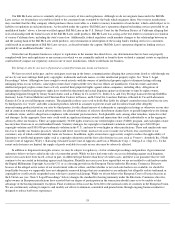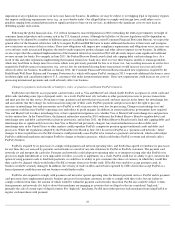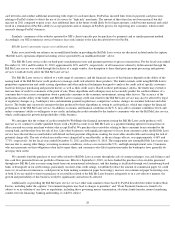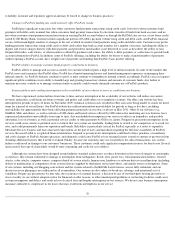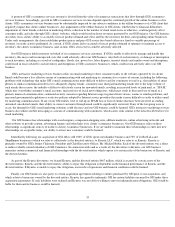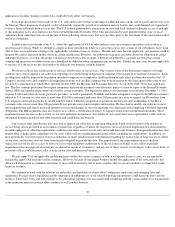eBay 2011 Annual Report Download - page 30
Download and view the complete annual report
Please find page 30 of the 2011 eBay annual report below. You can navigate through the pages in the report by either clicking on the pages listed below, or by using the keyword search tool below to find specific information within the annual report.
regulations (or, in the case of our GSI businesses, any such failure or perceived failure on the part of GSI or GSI's clients) could result in
proceedings or actions against us by governmental entities or others (e.g., class action privacy litigation), subject us to significant penalties and
negative publicity, require us to change our business practices, increase our costs and adversely affect our business. For example, the Federal
Trade Commission, or FTC, has recently entered into an a number of consent decrees with major online companies, including Facebook and
Google, to settle allegations of unfair or deceptive privacy practices. The FTC's consent decrees with Facebook and Google require those
companies to implement a comprehensive privacy program and undergo regular, independent privacy audits for the next 20 years, among other
requirements.
Certain of our businesses, including GSI's interactive marketing services business, utilize “behavioral marketing” (generally, the tracking of
a user's online activities) to deliver relevant content to Internet users. The FTC has released a Staff Report with principles to address consumer
privacy issues that may arise from behavioral marketing and to encourage industry self-regulation. The FTC also has issued a Staff Report in
December 2010 on consumer privacy policy, proposing a set of self-regulatory best practices and several policy recommendations for
consideration by Congress, including institution of "do not track" mechanisms. Any such regulations or legislation could, if enacted, prohibit the
use of certain technologies, including those that track individuals' activities on the Internet or geolocation via mobile devices. Such laws and
regulations could restrict our ability to collect and use page viewing data and personal information, which may reduce demand for our services or
require changes to our current business models, which could harm our business.
Data collection, privacy and security have become the subject of increasing public concern. If Internet and mobile users were to reduce their
use of our websites and services as a result, our business could be harmed. As noted above, we are also subject to the possibility of security
breaches, which themselves may result in a violation of these laws.
Our revenue from advertising is subject to factors beyond our control.
We derive significant revenue from advertising on our websites. Revenues from online advertising are sensitive to events and trends that
affect advertising expenditures, such as general changes in the economy and changes in consumer spending, the effectiveness of online advertising
versus offline advertising media and the value our websites provide to advertisers relative to other websites. The economic downturn adversely
impacted our advertising revenue. In addition, major search engine operators have the ability to change from time to time, at their sole discretion,
the rules and search algorithms governing the pricing, availability and placement of online advertising. Any changes in these rules or search
algorithms could materially reduce the value that we derive from online advertising on our websites, either directly or indirectly. For example,
retailers pay a fee to Shopping.com for online shoppers directed to their websites by our Shopping.com website. Rule changes made by search
engines beginning in 2008 disrupted traffic to our Shopping.com website, which in turn adversely affected click-through traffic to retailers from
our Shopping.com website and associated fee revenue. Finally, legislators and regulators in various jurisdictions, including the U.S. and the
European Union, are reviewing Internet advertising models and the use of user-related data and considering proposals that could restrict or
otherwise impact this business model. If we experience a reduction in our advertising revenues due to economic, competitive, regulatory,
technological or other factors, or the renegotiation of the terms of our contracts with major advertising companies, or a reduction in our ability to
effectively place advertisements on our sites, or are otherwise unable to provide value to our advertisers, our business and financial results would
suffer.
Our growth will depend on our ability to develop our brands, and these efforts may be costly.
We believe that continuing to strengthen our brands will be critical to achieving widespread acceptance of our services, and will require a
continued focus on active marketing efforts across all of our brands. We will need to continue to spend substantial amounts of money on, and
devote substantial resources to, advertising, marketing, and other efforts to create and maintain brand loyalty among users. Since 2005, we have
significantly increased the number of brands we are supporting, adding Shopping.com, our classified websites (including Den Blå Avis, BilBasen,
eBay Classifieds (including eBay Anuncios, eBay Kleinanzeigen and eBay Annunci), Gumtree, Kijiji, LoQUo, Marktplaats.nl, mobile.de,
Alamaula and Rent.com), StubHub, Bill Me Later, Gmarket, Milo, WHERE, Red-Laser, Zong and GSI, among others. Each of these brands
requires its own resources, increasing the costs of our branding efforts. Brand promotion activities may not yield increased revenues, and even if
they do, any increased revenues may not offset the expenses incurred in building our brands. Also, major search engine operators that we use to
advertise our brands have frequently changing rules that govern the pricing, availability and placement of online advertisements (e.g., paid search,
keywords), and changes to these rules could negatively affect our ability to use online advertising to promote our brands in a cost-effective
manner. If we fail to promote and maintain our brands, or if we incur substantial expenses in an unsuccessful attempt to promote and maintain our
brands, our business would be harmed.
25





